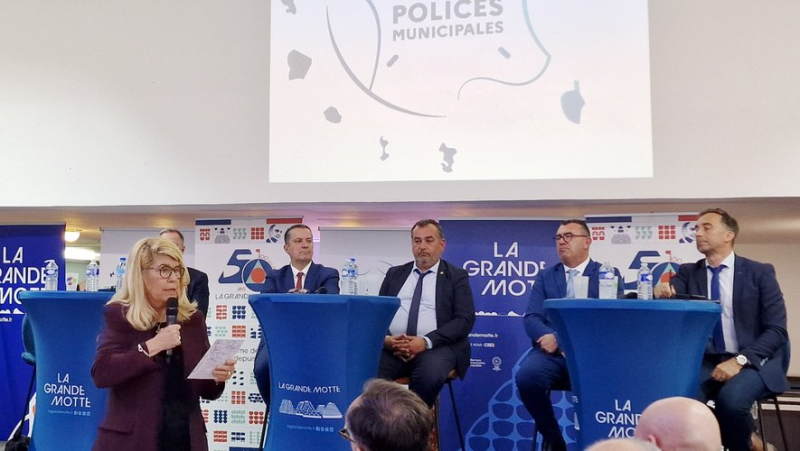“Beauvau of municipal police” in La Grande-Motte: what new missions for the third security force ?

Dominique Faure, la ministre des collectivités territoriales présente à La Grande-Motte lundi 27 mai. DR
The third series of discussions on the place and role of the 28,000 municipal police officers and rural guards took place in La Grande-Motte (Hérault), this Monday, May 27. The government would like to give them more prerogatives to also relieve the gendarmerie and national police.
Launched on April 5 by the government, the "Beauvau municipal police" found an unprecedented extension in the provinces on Monday May 27. For its third meeting, this cycle of discussions relocated to La Grande-Motte (Hérault), on the initiative of its mayor Stéphan Rossignol (LR) and with the participation of Dominique Faure, Minister Delegate in charge of local authorities and Rurality.
The idea: reflect on the evolution and status of these 28,000 municipal police officers and rural guards, representing the third internal security force in the country, and "making everyday security more efficient" indicated Gérald Darmanin during the presentation, at a time when these agents will also contribute to the smooth running of J.O.
"For the first time, the elected officials are around the table"
"The objective is to ask the right questions about the place, the role of the municipal police and to know if the’ we must not modify the Chevènement law which has governed us since 1999, i.e. 25 years, while society has evolved"summarizes Jean-Michel Weiss, secretary general of the autonomous federation (FA-FTP) municipal police Hérault-Gard, who participated in the discussions. "What is historic, for the first time, we are bringing local employers to the table, namely elected officials, mayors, parliamentarians and representatives of the profession" .
Concretely, two themes raise questions. First, the overall position of the agent, their conditions of remuneration, retirement or training. Then and above all, the prerogatives of these police officers who, in France, are now 56% equipped with firearms, and who could embrace new skills.
Avenues are being examined because the Minister of the Interior would welcome the expansion of their field of intervention on security. And current situations are absurd for many observers.
If a municipal police officer sees an individual rolling a joint, he does not have the power to intervene
"Let's take the example of the fight against narcotics : if an agent notices the presence of an individual in rolling a joint on the public highway, today he must inform a judicial police officer from the national police or the gendarmerie. ;violation and issue fine", illustrates Jean-Michel Weiss, also FA-FTP national secretary.
Or also on the question of street sales: the idea would be that the municipal authorities could establish a procedure to reduce the burden on the state law enforcement agencies. Ditto on their jurisdiction on the coastal strips, where the power of these territorial agents is limited to navigation without the ability to issue a fine for lack of navigation license or equipment.
Idem for consultation of files, limited: that of stolen vehicles or wanted people is not accessible to them for the time being.
Today still, the agent can carry out identity checks for a limited number of offenses, tomorrow for any criminal offense. "That is to say, giving him a free hand so that he can be more efficient and less likely to call on the national police and the gendarmerie."
But for the union, the limit lies in the attribution of the status of judicial police officer – OPJ allowing for hearings or seizures – what the government suggests, supported, for example, by Christian Estrosi, the mayor of Nice.
France Urbaine, the transpartisan association of large cities and towns, in a context where municipal agents are often the first to intervene, also warns.
Remain a community police force
"These trends should not ultimately result in a transfer of responsibility between the police and the national gendarmerie and the municipal police" writes David Marti, mayor of Le Creusot, who participated in the initial debates. Urban France remains attentive to the fact that the municipal sector also remains a local police force: "it does not have to be transferred the fight against drug trafficking, organized crime or maintaining law and order.
Added to this is a figure to take into account: over the next five years, 11,000 municipal police positions will be vacant.
The national municipal police show
La Grande-Motte is also hosting the national municipal police show this Wednesday, May 29. This year, the exhibitor record has been broken with 76 stands which will present the latest developments in terms of vehicles, means of intervention and artificial intelligence. More than 1,050 agents are now registered to both attend the CNFPT conference on training and discover trends and innovations.
I subscribe to read more




